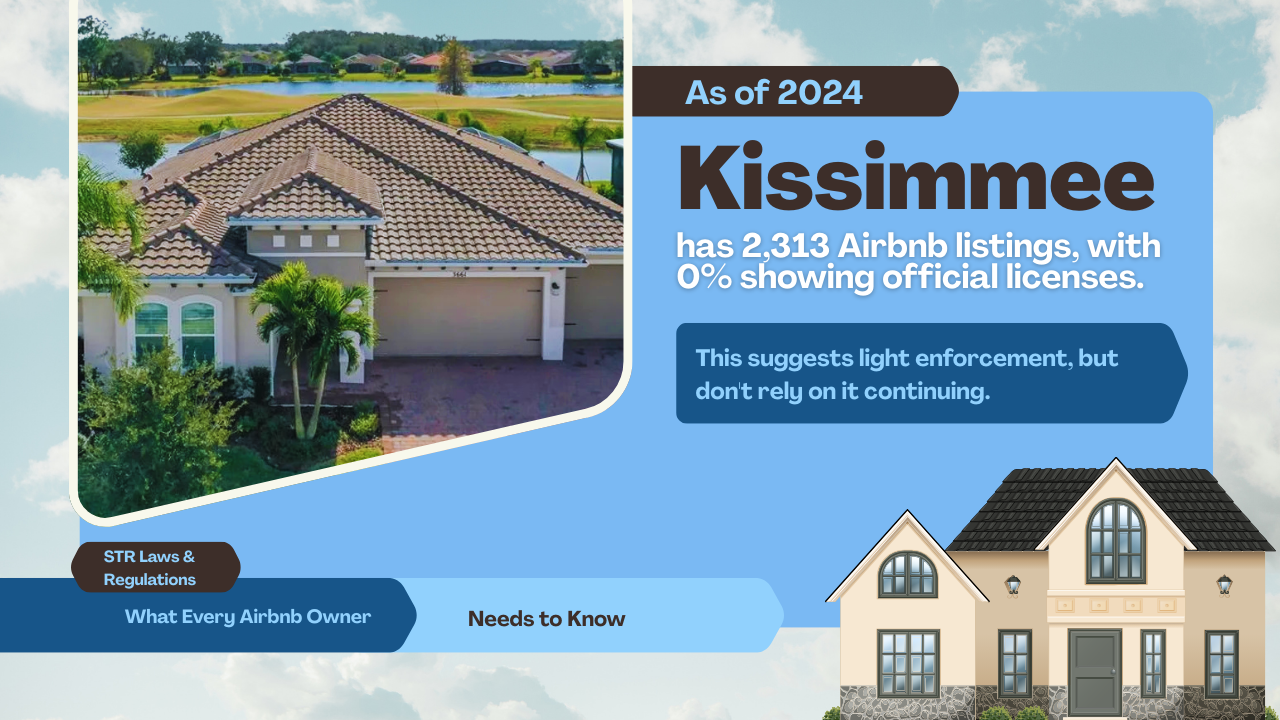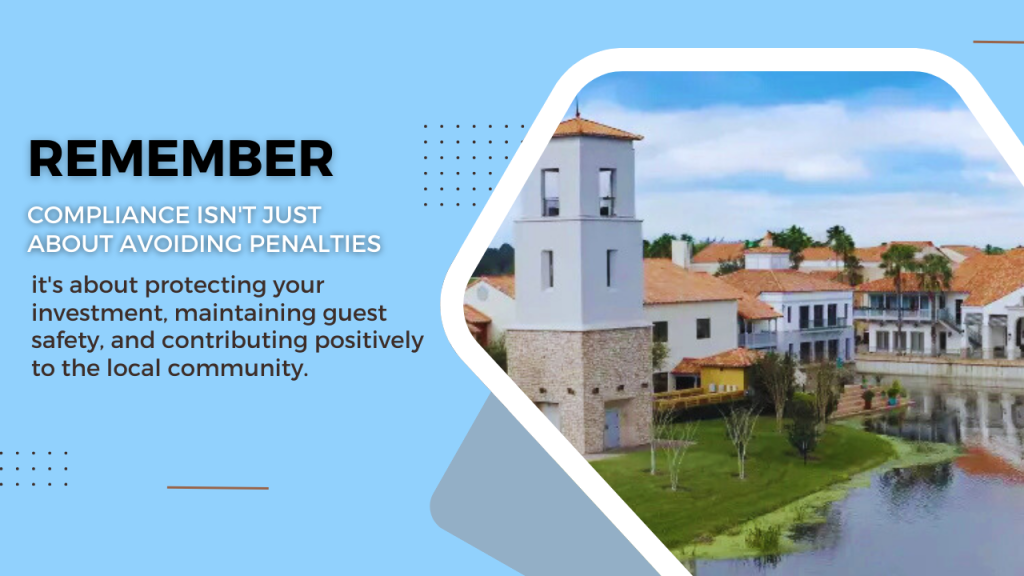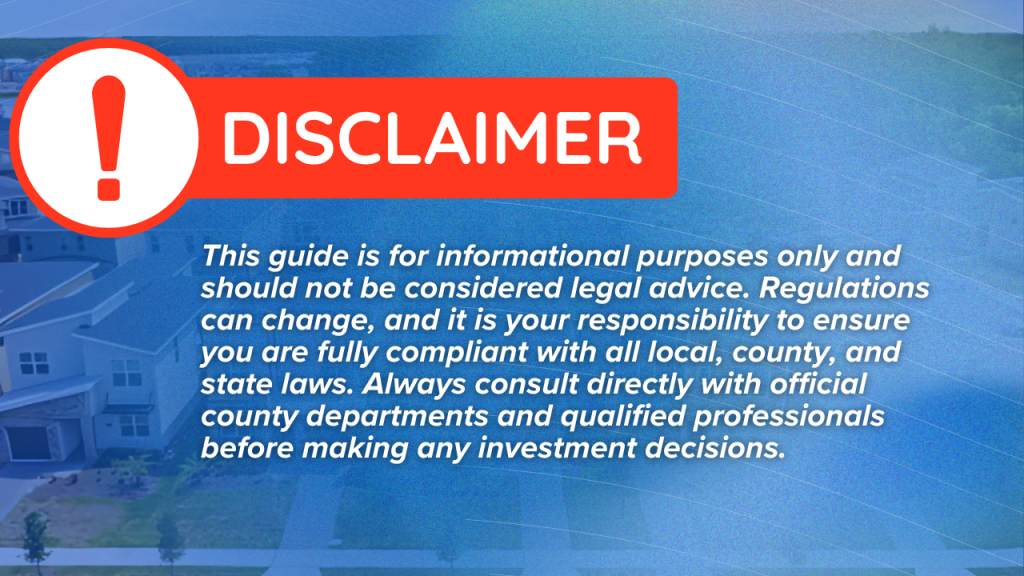Getting into the short-term rental game in Osceola County? Smart move! This Orlando-area hotspot attracts millions of Disney-bound visitors each year. But before you list that property, you need to know the rules.
Osceola County has specific laws governing short-term rentals. The good news? It’s one of Florida’s more investor-friendly counties. The challenge? Regulations vary by city and can change quickly.
Let’s break down everything you need to know to operate legally and profitably.
What Counts as a Short-Term Rental in Osceola County?
In Osceola County, a short-term rental (STR) is any property rented for 30 days or less. This includes:
- Single-family homes
- Condos and townhomes
- Vacation villas
- Any dwelling designed for temporary stays
Key point: If you rent more than three times per year for stays under 30 days, you need proper licensing.
Required Licenses and Permits
State Requirements: DBPR License
Every short-term rental in Florida needs a Department of Business and Professional Regulation (DBPR) license. This is non-negotiable.
What you need:
- Completed application at myfloridalicense.com
- Proof of property ownership
- Safety inspection (for buildings 3+ stories)
- Application fees
County Requirements: STR License
Osceola County requires its own short-term rental license on top of the state requirement.
Application requirements:
- STR license application form
- Proof of ownership (deed or tax bill)
- Valid photo ID
- Detailed floor plan showing safety equipment locations
- Proof of $1,000,000 liability insurance
- Signed and notarized compliance affidavit
- Initial inspection fee ($160) + license fee ($250)
Processing time: 2-4 weeks if all documents are complete.
Annual renewal: $150 fee each year.
Zoning: Where STRs Are Actually Allowed
Here’s where it gets tricky. Not every property in Osceola County can legally operate as a short-term rental.
STR Overlay Districts
Short-term rentals are only permitted in designated STR Overlay Districts or STRPD (Short Term Rental Planned Development) zones. These are typically near:
- Disney World and theme parks
- Tourist corridors
- Established vacation rental communities
City-Specific Rules
Kissimmee:
- Generally STR-friendly
- Requires Conditional Use Permit + Business Tax Receipt
- Light enforcement reported by hosts
St. Cloud:
- Very restrictive
- STRs are only allowed in hotel/motel zones
- Strict enforcement with $500+ fines for violations
Unincorporated Osceola:
- Must be in approved overlay districts
- Standard county licensing applies
Pro tip: Always verify zoning before buying. A property outside approved zones cannot legally operate as an STR.
Tax Obligations: What You’ll Pay
Short-term rental operators in Osceola County collect and remit a combined 13.5% in taxes:
- Florida State Sales Tax: 6%
- Osceola Tourist Development Tax: 6%
- Discretionary Sales Surtax: 1.5%
Important: These taxes apply to your total rental amount, including cleaning fees, pet fees, and any other charges.
How to Register
- Register with Florida Department of Revenue for state taxes
- Register with Osceola County Tax Collector for Tourist Development Tax
- File monthly returns (even if no rentals occurred)
Note: Osceola County doesn’t work with Airbnb or VRBO for tax collection. You’re responsible for all filings.
Operational Requirements
Occupancy Limits
- Maximum: 3 guests per bedroom + 2 additional guests total
- Must maintain the guest register for 3 years
- Include names, addresses, dates, and contact information
Safety Requirements
- Working smoke detectors in all required locations
- Fire extinguishers are properly placed
- Clear emergency exit routes
- Pool barriers (if applicable)
- Current Certificate of Occupancy
Insurance
- Minimum: $1,000,000 liability coverage
- Standard homeowner’s insurance typically doesn’t cover STR use
- Must provide proof with license application
Enforcement: How Strict Is Osceola County?
Enforcement varies significantly by location:
Kissimmee: Generally lenient. Many hosts operate with minimal interference, though formal requirements still exist.
St. Cloud: Very strict. Active code enforcement with $500/day fines for violations. Hosts report receiving cease and desist orders.
Unincorporated Areas: Moderate enforcement. Focus on properties operating outside approved zones.
Current Market Statistics
As of recent data, Kissimmee hosts 2,313 Airbnb listings with remarkable statistics:
- Average occupancy rate: 67%
- Average daily rate: $169
- Annual revenue potential: Up to $41,196
Notably, 0% of these listings currently display official short-term rental licenses, suggesting widespread non-compliance despite the regulations being on the books.

How to Start Your STR Business
Step 1: Verify Zoning
Contact the Osceola County Zoning Office at (407) 742-0200 or email [email protected] to confirm your property is in an approved zone.
Step 2: Obtain State License
Apply through the DBPR website. Get this first—you’ll need it for the county application.
Step 3: Apply for County STR License
Submit all required documents and fees. Schedule your inspection.
Step 4: Register for Taxes
- Register with Florida Department of Revenue
- Register with Osceola County Tax Collector
Step 5: Get Insurance
Secure proper liability coverage before your first guest.
Step 6: HOA Check
Many STR properties have HOA restrictions that may be stricter than county rules.
Recent Changes and What’s Coming
Florida’s Senate Bill 280 was vetoed by Governor DeSantis in 2024, preserving local government authority over STRs. This means:
- Osceola County retains control over its regulations
- No statewide preemption of local rules
- Continued variation between cities and counties
Stay alert: Local regulations can change with elections or community pressure.
Who to Contact
Osceola County Community Development
- Phone: (407) 742-0200
- Email: [email protected]
- Address: 1 Courthouse Square, Suite 1400, Kissimmee, FL 34741
For specific issues:
- Zoning questions: [email protected]
- Code enforcement: [email protected]
- Permitting: [email protected]
- Tax registration: Osceola County Tax Collector at (407) 742-4000
Your Next Steps
Osceola County offers excellent opportunities for short-term rental investors. The key is proper compliance from day one.
Before you buy or list:
- Verify the property is in an approved STR zone
- Budget for all licensing fees and insurance
- Plan for 13.5% tax obligations
- Check HOA restrictions
- Consider enforcement patterns in your specific area
The regulatory landscape may seem complex, but thousands of hosts successfully operate profitable STRs in Osceola County. With proper preparation and compliance, you can too.
Ready to navigate Osceola County’s short-term rental regulations with confidence? The rules are manageable when you have expert guidance.

Need Help Understanding Osceola County STR Regulations?
Don’t Navigate the STR Rules Alone
Trying to piece together Osceola County’s STR laws can feel overwhelming. The rules change, enforcement varies, and one mistake can cost you. That’s where having an expert on your side makes all the difference.
As a Realtor® and STR operator in Osceola County, I help investors cut through the confusion. I guide my clients step-by-step, from finding properties in STR-friendly zones to navigating permits and tax compliance. I translate complex rules into plain English, so you can invest with total confidence.
If you’re ready to build a successful vacation rental business without the legal headaches, let’s talk.
Schedule a Free Consultation Today
Don’t let regulatory confusion cost you time and money. Get personalized guidance from someone who understands both the investment potential and legal requirements in Osceola County’s competitive STR market.




 EN
EN
 ZH
ZH